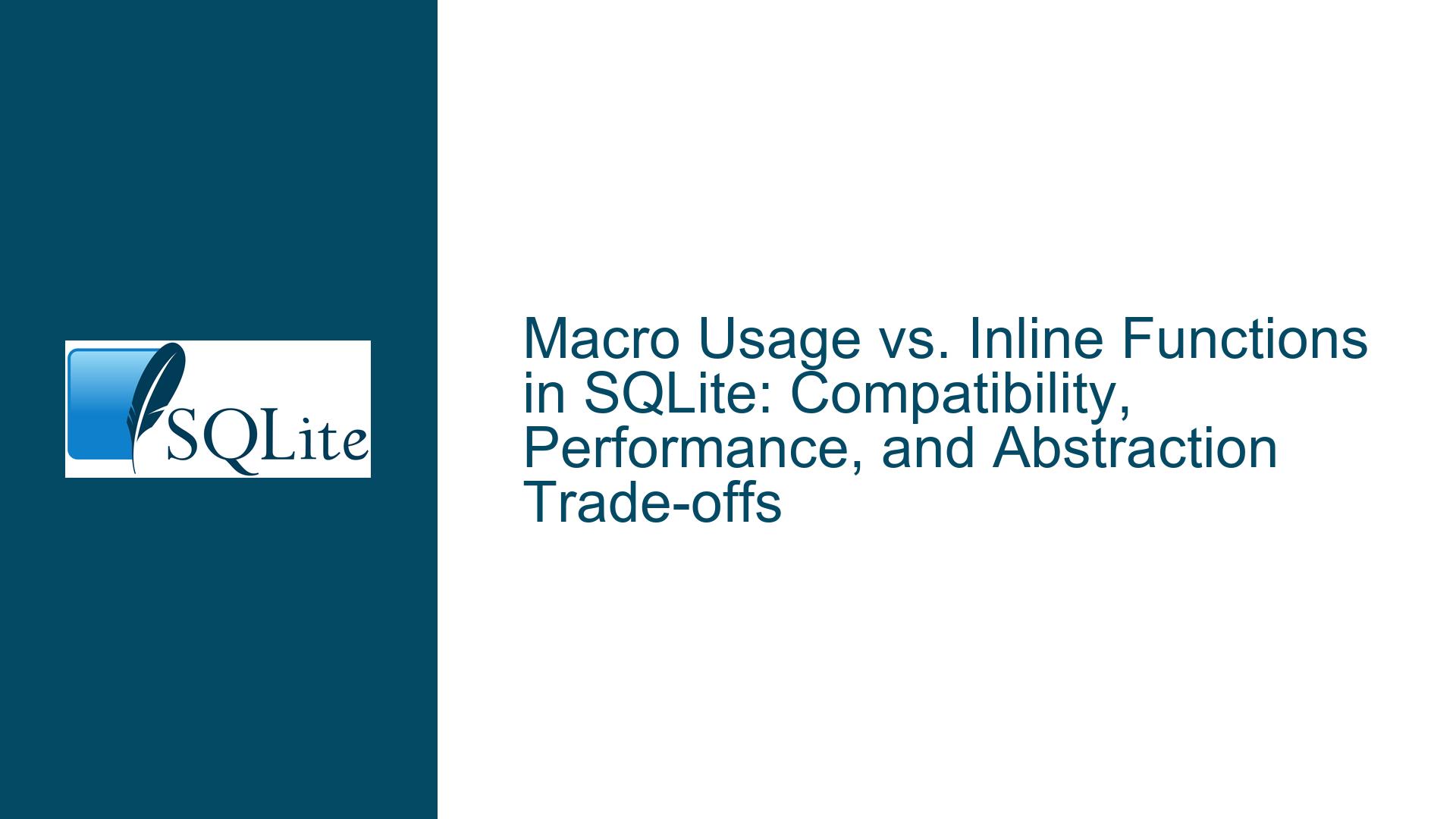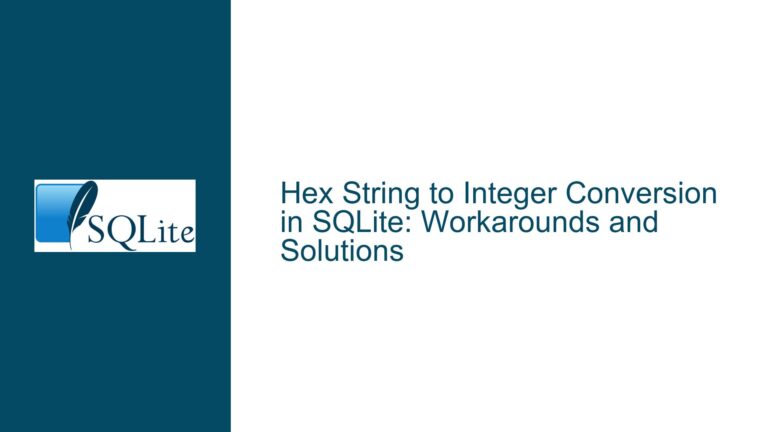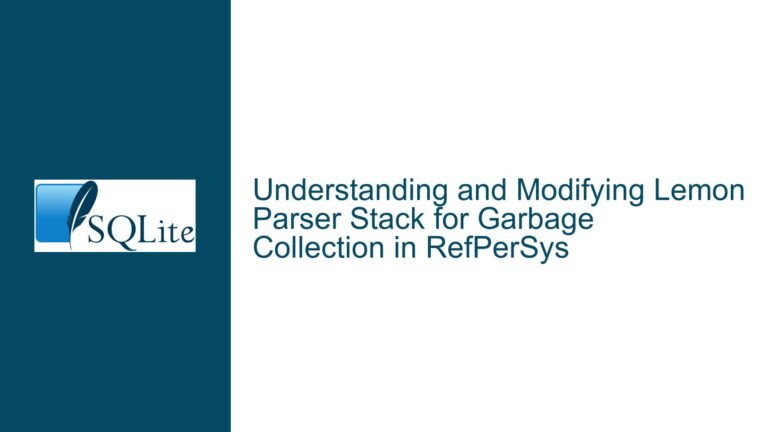Macro Usage vs. Inline Functions in SQLite: Compatibility, Performance, and Abstraction Trade-offs
1. Technical Context: Macro-Centric Design in SQLite’s Codebase and Query Layer
SQLite’s implementation relies heavily on C preprocessor macros for performance-critical operations, type-agnostic utilities, and code clarity. A recurring debate in software engineering circles involves the trade-offs between using macros and static inline functions in C code. This discussion extends to SQLite’s codebase, where developers have deliberately chosen macros for specific use cases. Additionally, users have proposed extending macro-like abstractions to SQL queries to manage complexity, raising questions about SQLite’s approach to code maintainability, backward compatibility, and runtime efficiency.
1.1 The Core Debate: Macros vs. Inline Functions
In C programming, macros (#define) and static inline functions serve overlapping but distinct roles. Macros perform textual substitution during preprocessing, enabling code generation that bypasses function call overhead and supports type-agnostic operations. However, they lack type safety, introduce scoping issues, and can cause unintended side effects due to multiple argument evaluation. Static inline functions, introduced in C99, provide type checking, single evaluation of arguments, and scope control but require compiler support for inlining to match macro performance.
The SQLite codebase prioritizes portability and compatibility with C89, which lacks native support for inline functions. For example, the ISLOWER macro in lemon.c casts its argument to unsigned char before invoking islower(), avoiding undefined behavior for negative char values. Replacing this with a function would require C99 features, breaking compatibility with older compilers.
1.2 SQL Query Abstraction: User-Defined Macros
Beyond the C layer, users have implemented custom preprocessors to inject macro-like abstractions into SQL queries. These systems allow parameterized code reuse, such as embedding complex subqueries or expressions via placeholders (e.g., set transform(a,b,c) = ...). While this improves readability, it introduces risks like naming collisions, ambiguous syntax, and opaque debugging. SQLite’s native lack of SQL-level macros forces users to rely on external tools or string manipulation, which complicates query validation and optimization.
2. Root Causes: Why SQLite Favors Macros and Resists Abstractions
2.1 C89 Compatibility and Compiler Constraints
SQLite targets C89 to ensure compatibility with legacy systems, embedded environments, and niche compilers. Many industrial control systems, IoT devices, and proprietary toolchains lack C99/C11 support. Using inline functions would exclude these platforms, contradicting SQLite’s "one source file, runs anywhere" philosophy. For instance, the snprintf() migration debacle (where C99’s snprintf() caused issues on macOS) underscores the risks of adopting newer standards prematurely.
2.2 Performance and Zero-Cost Abstractions
Macros eliminate function call overhead, which is critical in performance-sensitive code paths like the virtual machine (VDBE) or B-tree traversal. Even with modern compilers, inline functions are compiler hints, not guarantees. Macros ensure inlining, enabling zero-cost abstractions. For example, the ISLOWER macro avoids a function call entirely, whereas a static inline function might not inline on C89 compilers, degrading performance.
2.3 Type Flexibility and Code Generation
Macros excel at generating type-agnostic code. SQLite’s internal APIs (e.g., sqlite3_malloc(), sqlite3_value_text()) use macros to wrap platform-specific logic while maintaining a uniform interface. Replacing these with functions would require duplicating code for each type or using _Generic (C11), further limiting compatibility.
2.4 Maintainability and Code Conventions
SQLite’s codebase uses uppercase macros to signal "unsafe" operations (e.g., multiple evaluation risks). This convention aids readability and warns developers to use them cautiously. Introducing functions for existing macros would obscure this distinction, requiring extensive code audits to avoid regressions.
2.5 SQL Query Complexity and Abstraction Limits
SQLite’s optimizer relies on explicit query structure for cost-based decisions. User-defined macros or preprocessors obfuscate the final query, making it harder to reason about indexes, join order, or subquery flattening. For example, a macro expanding to a correlated subquery might prevent the optimizer from rewriting it as a join, leading to unintentional O(n²) behavior.
3. Strategies for Balancing Abstraction, Performance, and Compatibility
3.1 Adhering to C89 While Mitigating Macro Pitfalls
- Compiler-Specific Extensions: Use
#ifdefto conditionally enableinlinefunctions where supported (e.g.,__inline__in GCC). This retains C89 compatibility while allowing modern compilers to optimize. - Wrapper Macros: Combine macros with functions to enforce type safety. For example:
#if __STDC_VERSION__ >= 199901L static inline int ISLOWER(char x) { return islower((unsigned char)x); } #else #define ISLOWER(x) islower((unsigned char)(x)) #endif - Static Analysis: Use Clang’s
-Wshadowand-Wmacro-redefinedto detect scoping issues or unintended macro expansions.
3.2 Optimizing SQL Query Readability Without Macros
- Common Table Expressions (CTEs): Decompose complex queries into named subqueries using
WITH clauses. CTEs act as "query macros" and are optimized by SQLite’s planner:WITH transformed_data AS ( SELECT a + b AS ab FROM t1 WHERE rowid = ? ) SELECT ab FROM transformed_data; - Views: Encapsulate frequently used joins or calculations into views. Views provide abstraction without runtime expansion risks.
- User-Defined Functions (UDFs): Extend SQLite with C/C++ UDFs for reusable logic. UDFs are type-safe and participate in query optimization.
- External Preprocessors: If macros are unavoidable, integrate a lightweight preprocessor (e.g., M4, Python’s Jinja) with strict validation rules. Use
sqlite3_expanded_sql()to log the final query for debugging.
3.3 Evaluating C99/C11 Adoption in Future Releases
- Incremental Migration: Isolate C99-dependent features (e.g.,
snprintf(),inline) behind compatibility layers. Offer a "legacy" build flag for C89 purists. - Community Feedback: Gauge user willingness to abandon older platforms via mailing lists or forums. Prioritize features that benefit the majority without fracturing the userbase.
3.4 Best Practices for Macro Usage in SQLite
- Naming Conventions: Reserve uppercase names for macros with side effects (e.g.,
SQLITE_MALLOC). Usestatic inlinefunctions for type-safe utilities where C99 is permissible. - Argument Isolation: Parenthesize macro arguments and entire expressions to prevent operator precedence errors:
#define MAX(a,b) ((a) > (b) ? (a) : (b)) - Documentation: Annotate macros with caveats (e.g., "evaluates arguments multiple times") in header files.
3.5 Addressing SQL Macro-Like Abstractions
- Native SQL Macros: Propose a syntax extension (e.g.,
DEFINE MACRO) to the SQLite team, leveraging community feedback. Ensure macros expand transparently for the optimizer. - Linter Integration: Develop a linter that flags ambiguous macro expansions (e.g., column-name clashes) in preprocessed SQL.
This guide provides a comprehensive roadmap for developers navigating SQLite’s macro-centric design philosophy, offering pragmatic solutions for maintaining compatibility, performance, and code clarity across both C and SQL layers.






